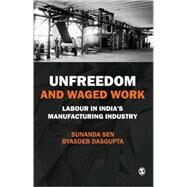Unfreedom and Waged Work : Labour in India's Manufacturing Industry
, by Sunanda Sen- ISBN: 9788178299402 | 8178299402
- Cover: Hardcover
- Copyright: 5/12/2009
Unfreedom and Waged Work: Labour in India's Manufacturing Industry is a study on issues related to labour in India's manufacturing industry, and a critique of contemporary assumptions on its state, on the basis of both primary and secondary data. The study was carried out in terms of secondary as well as primary data. A disaggregated analysis of organized manufacturing industry was attempted in terms of 3-digit level ASI data for 50 industry groups for the period 1981-2003. The secondary data based analysis was followed by analyses based on primary data collected from filed survey of factory labourers and management of selected firms in a few industrial areas of West Bengal, Delhi, Uttar Pradesh, Haryana, Gujarat and Maharashtra during 2003-06.The authors discuss contemporary issues pertaining to labour in mainstream economics and build a critique based on empirical findings regarding "job-less growth" in India in the post liberalization era. They analyze labour in different industry groups and suggest that increasing use of labour displacing technologies has rendered labour condition and employment growth precarious, which is reflected in terms of different variables of analysis like capital-labour ratio, employment elasticity of output, labour productivity, and employment growth.The authors also present a microanalysis of labour in terms of different dimensions of industry (industrial growth rates, age of workers, education), construct a labour security index for different categories of workers in different areas in the sample which clearly shows declining levels of different forms of security (income, work, financial, voice representation, family support etc.) in the liberalization era. Issue of labour policy reform and trade union in the present context along with a detailed critique of the National Commission of Labour Report are also discusses.







